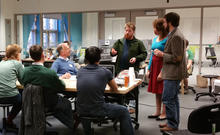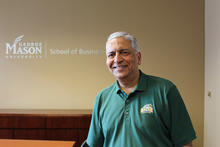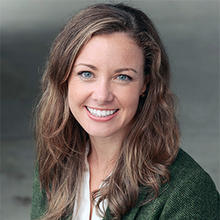The Costello College of Business at George Mason University is an acknowledged center for global business research.
Faculty take a multidisciplinary approach, with the goal of ensuring that business can be a force for the greater good.
Faculty publish in leading business journals on wide-ranging global business issues, are cited by the press, and are actively engaged in making discoveries to address a wide set of societal and institutional challenges.
Impactful Scholarship
Three pillars define the real-world impact of Costello College of Business thought leadership:
Ensuring Global Futures
Safeguarding our planet and societies from the crises identified in the United Nations Sustainable Development Goals (SDGs). Recent highlights include:
- Are Electric Cars Really Green? mic.com
- CPG Can No Longer Afford to Harm the Planet AdWeek.com
- Supporting the Honey Bee to Make the World a Better Place School of Business News
- Embedding the SDGs into Business Education The PRME Blog
Digital Transformation of Work
Preparing global organizations and professionals for the massive technological changes that are reshaping business.
- Facilitating a Paradigm Shift: An Acquisition Playbook for the Information Age School of Business News
- As Offices Reopen, Hybrid Onsite and Remote Work Becomes Routine SHRM.org
- How to Manage Performance Evaluations in the Work-From-Home Era New York Times
- Employees Are Working An Extra Day In Unpaid Overtime Each Week Forbes.com
Entrepreneurship and Innovation
Fostering the creative problem-solving skills needed for success in an increasingly unpredictable world.
- Using Geospatial Technology to Promote Economic Development of Africa School of Business News
- Prince Harry isn't the first famous name in tech, but his role at S.F. startup is rare San Francisco Chronicle
- For $40/Month, Equinox's Variis App Is Now Accessible to All Well+Good
Costello College of Business Faculty Research
- September 8, 2022We’ve all become familiar with the pandemic-related reasons behind the upheaval in the labor market, as well as the standard-issue solutions like trying to infuse work with purpose or offering employees remote working. While these are practical suggestions, they have not restored stability to the workforce. It is our contention that any broad-brush advice for retaining employees in the current environment will be insufficient. Whether managers like it or not, employees will demand sensitivity and adjustment to their psychological needs as individuals.
- August 30, 2022In her 2021 PhD dissertation, Ashley Yuckenberg, a trained journalist and assistant professor of business communications at Mason, plumbs the ethical quandaries of crisis coverage—and provides a framework for guiding journalists through them.
- August 16, 2022Long before COVID was a household word, Dr. Ajay Vinzé, now dean of Mason’s business school, helped pioneer a collaboration with public-health officials in Maricopa County, Arizona, to help predict possible outcomes of various interventions as part of research on pandemic response. Vinzé calls this nearly decade-long partnership “a major part of my research and professional journey.”
- August 9, 2022Brian Ngac and Nirup Menon, from the information systems and operations management area at the School of Business, were recently awarded a $100,000 grant from the Commonwealth Cyber Initiative (CCI) located in Arlington, Virginia. This Commonwealth Cyber Initiative Grant was awarded for their proposal to develop a new experiential learning program that will engage students and companies from the Commonwealth.
- July 21, 2022Hierarchy has its upsides and downsides. A pyramidical power structure works well for day-to-day decision making. But as the distance between the base and the tip of the pyramid increases, tensions between organizational tiers can create obstacles to reform. It’s a matter of “the unconscious dynamics of humans in groups and systems” rather than a deliberate response, says Renee Rinehart Kathawalla, a postdoctoral research fellow of management at Mason.
- June 7, 2022In business, a specialist strategy can sometimes be riskier than a generalist one. Competing in only one industry leaves firms highly vulnerable to heightened income volatility, with extreme gains and losses, often alternating in quick succession. Innovative firms, whose business models are based on heavy R&D investments with uncertain returns, are especially affected by these fluctuations. Kelly Wentland, assistant professor of accounting, discusses this issue.
- June 2, 2022Government corruption has universally corrosive effects on U.S. society. Yet there is little uniformity to the structure of state-level corruption oversight agencies. Syrena Shirley, an assistant professor of accounting at Mason, recently published a research paper in Current Issues in Auditing suggesting that in the fight against corruption, these structural inconsistencies are impactful.
- May 3, 2022These days, devising an outsourcing strategy involves a host of challenges and opportunities. Between deglobalization and pandemic-induced supply chain issues, the 20th century practice of moving manufacturing to wherever labor was cheapest is paying smaller and smaller dividends. As the value proposition of cost-cutting diminishes, a different rationale for outsourcing—one based upon maximizing synergies—is gaining traction. Cheryl Druehl, associate professor of operations management and associate dean for faculty at Mason, lays out a model to help managers think about how to outsource in this new world in her recently published paper in IEEE Transactions on Engineering Management.
- May 2, 2022In the earliest stage of innovation, creative proposals are judged according to their perceived novelty and usefulness. Sharaya Jones, assistant professor of marketing at Mason, has a simple yet counterintuitive rule for would-be innovators hawking their ideas: More is more. Her recent paper in Marketing Science, co-authored by Laura J. Kornish of University of Colorado Boulder, pits verbose and detailed idea descriptions against terse ones.
- April 29, 2022Einav Hart, an assistant professor of management at George Mason University’s School of Business, shows the economic implications of negotiators’ relationships, and how these economic implications affect how people negotiate. Her recent paper in Organizational Behavior and Human Decision Processes (co-authored with Maurice Schweitzer at the Wharton School of the University of Pennsylvania) introduces the construct “ERRO” (the Economic Relevance of negotiators’ Relational Outcomes) to shed light on when negotiators should consider their future relationships.
- April 28, 2022According to a recent working paper co-authored by Mason finance professors Lei Gao and Bo Hu, more than 80 percent of U.S. public firms use graphics in their annual reports. Further, visual presentation has market benefits as well as aesthetic ones.
- April 27, 2022Bret Johnson, assistant professor of accounting at Mason, recently co-authored a paper in Management Science finding that SEC comment letters are leaking out among investors close to the company concerned, who then use it to their advantage. Technically, such information-sharing violates Regulation Fair Disclosure (FD), which prohibits companies from sharing secrets with network partners such as institutional investors and analysts.












